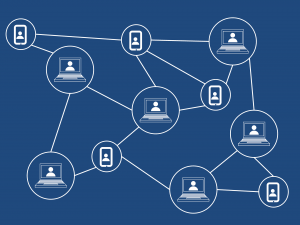How Crypto & Advertising Blockchain Are Disrupting The Advertising Industry

Cryptocurrency technology has always been excluded from the advertising industry, but blockchain technology can reinvest in innovation and change space. Blockchain is one of the most talked-about new technologies. Many believe that blockchain-based platforms have the potential to revolutionize key industries, especially financial services and global trade. But how can blockchain impact digital advertising? Let’s know here…
What Is Blockchain Technology?
Blockchain is a distributed database that contains information about all transactions carried out by system participants. Information is stored as a chain of blocks. Each of them contains a certain number of transactions.
The word “distributed” means there is no centralized organization that would audit this process. Blockchain technology emerged several years ago and immediately opened up new perspectives for data exchange.
The term first appeared as the name of a fully replicated distributed database implemented in the Bitcoin system, which is why blockchain is often referred to as transactions in various cryptocurrencies, but blockchain technology can be extended to any interconnected information block.

Blockchain Technology System
The blockchain is more reliable than traditional databases because the information is stored not on the servers of a company or organization, but on all computers of the blockchain network.
Almost anything with any value can be tracked and sold using the blockchain. This technology reduces risks and costs for all parties involved.
Business depends on data. Data acquisition speed and accuracy are critical. Blockchain is ideal for providing such information as it offers authorized network participants instant, general, and completely transparent access to information in an immutable ledger.
The blockchain network allows you to track orders, payments, accounts, items, and more. And because all participants share a single source of trusted data, you can view all transaction details at any time to work with greater confidence and gain new benefits and opportunities.
Blockchain technology has the potential to transform established business processes and radically change how regulators work. Nevertheless, blockchain remains an experimental technology – many of the problems of its use have not yet been resolved.
Data On Blockchain:
The total capitalization of the cryptocurrency market has grown by more than 2500% and amounted to $ 481 billion. The two largest cryptocurrencies in terms of capitalization, bitcoin and ether, brought investors profit at the level of 1700% and 6900%, respectively.
In traditional markets, investors are sometimes unable to see such returns in their entire lives. It took the cryptocurrency market less than 12 months to achieve such results.

How Does The Blockchain Work?
Blockchain is a record storage system in which multiple independent sources validate the record before it is added to the data chain. Once the data is added, it cannot be changed, and the record is propagated to various nodes on the network.
Adding a new record (called a block) to a blockchain sequence requires that it be authenticated by multiple participants connected to the blockchain network. These data blocks communicate with each other in a chain. All blockchain participants can see all transactions in progress, but the identities of all participants are hidden.
Blockchain technology uses an algorithm to assign each block an encrypted hash code (a unique string of letters and numbers, sometimes called a “digital fingerprint”).
In addition to the hash code, each block contains a set of previous transactions with timestamps, as well as the hash code of the previous block, which serves as an invariable link between successive blocks of the chain.
Together, encryption and timestamps allow blockchain technology to automatically verify the persistence of this ever-increasing sequence of hash codes. This operation prevents new blocks from being inserted out of order, making it impossible to modify or falsify transaction data.
How Crypto & Blockchain Are Disrupting The Advertising Industry?
The reason for the sharp rise in cryptocurrencies has been the excitement associated with blockchain technology, which underlies most of them. Blockchain is a digital decentralized ledger that allows transactions to be registered without the involvement of a financial intermediary such as a bank.
Blockchain has five significant advantages over existing payment networks that could make it a pervasive technology in the financial services and other industries in the future.
Transparency:
One of the main reasons blockchain is so attractive to businesses is because the chains are almost always open source.
This means that other users or developers have the ability to change it as they please, but at the same time it makes it incredibly difficult to invisibly change previously registered data. The latter circumstance makes blockchain an especially reliable technology.
Reducing Transaction Costs:
Since the blockchain allows transactions to be carried out without an intermediary, for example, a bank, transaction participants, users or organizations, they do not incur the costs associated with the intermediary’s work, and their costs are reduced.
Acceleration Of Settlements For Transactions:
Ordinary banks sometimes take several days to complete a transaction. Such terms are due to the protocols in the banking software, as well as the fact that banks only work during normal business hours, five days a week. In addition, financial institutions can be located in different time zones and this can also delay the processing of the transaction.
Decentralization:
Another major reason for the appeal of blockchain is that the technology does not have a central point of data collection. Rather than running a massive data center and running all transactions through it, the blockchain effectively allows individual transactions to have their own authentication and authorization to communicate with each other. Information about specific blocks of the chain is scattered across different servers around the world, and this ensures that even if this information gets to outsiders, such as hackers, only a small amount of data will be compromised, and not the entire network.
User-driven Networks:
Finally, crypto investors tend to be attracted to blockchain features related to issues of control over the network. In the case of blockchain, this also does not require an intermediary; this task is solved by users and developers. For example, in August, the failure to reach an 80 percent consensus on the renewal of the Bitcoin blockchain led to the split of the cryptocurrency into two: Bitcoin and Bitcoin Cash.
Data Security:
Multiple duplication of data among its participants guarantees the safety and immutability of the information entered into the blockchain. Moreover, due to the specifics of the blockchain device, this information cannot be changed, edited or deleted. And the use of consensus algorithms means that all transactions included in the blockchain are confirmed.
Conclusion:
Blockchain technology is best known for supporting Bitcoin, however, there are many applications nowadays. This technology is a permanent record distributed between the parties, which demonstrates security measures based on the decentralization of information, mainly focused on the financial market. In this context, new research must be performed to add value to the Blockchain and ensure its credibility, expanding the network and influencing so beneficially in the country’s economy.

FAQ:
What is blockchain good for?
Blockchain is a method of transmitting and storing data based on the distribution of information. The data is stored simultaneously by all network participants in the form of a chain of encrypted blocks, moreover, information about the previous one is recorded in each next block.
Why blockchain?
Blockchain is a technology for creating digital uniqueness. Thanks to her, the digital document, in our case, the certificate, becomes not amenable to falsification.
What is the blockchain market?
The blockchain is more reliable than traditional databases because the information is stored not on the servers of a company or organization, but on all computers of the blockchain network. She will not stop working even if several of her computers are hacked.
How Crypto & Advertising Blockchain Are Disrupting The Advertising Industry Read More »
